13 Bad Excuses For Not Starting Your Business
If Nick Vujicic from the video above can do it, to be quite honest, then you better have a really good excuse why you can’t. If you’re not interested and it’s not for you, then that’s different. But if you’re using any of the excuses listed below, then I’m sorry but we’ve all heard them before. We know them all too well. These are 13 excuses, NOT REASONS, most people use for why they can’t start a business. The reality is you can, you just don’t want to enough. Because if you did, you’d find a way. None of them are reasons, they’re all excuses. And today I’m going to dispel each and every one of them.
1. I have no time.
Seriously? I call BS on that one. Almost everyone, and I mean almost everyone, has some free time or time that’s wasted.
Do you watch any tv shows? Do you go to any movies? Do you watch any sporting events? Do you go the pub/bar? Do you go out for dinners? Do you hang out on the patio or have barbecues with your friends on the weekends? I understand everyone needs time off to relax and so on, but no one said it was going to be easy either. If you do the math, and really look at how you spend your days, I have no doubt you can find at least 10 hours a week. And everyone can find at least a few hours each week!
2. I don’t know how.
Here’s a big secret, no one else really does either. There is no manual to being an entrepreneur. We just figure it out as we go along. The more experience you have, the better you get at it. Just like anything else.
If you want to look at it another way, it’s like riding a bike. No one knows how to ride a bike on their first try. But if you don’t start trying you won’t learn. The same is true with swimming, dancing, learning a new sport, learning a new language, programming. Even using a cell phone. It wasn’t that long ago that most people would say they couldn’t use a cellphone, and now almost everyone has one.
And unlike in the past, there’s a lot more information out there today. You’re not limited to just your local library, you can order virtually any book from Amazon. And if you don’t have the money, you can always research everything you need online on the internet. There’s no end of entrepreneurial information out there. The fact alone that you’re reading this article means you’re already learning from the internet!
3. I don’t have the money.
And? Only a really small subset of companies actually require a significant amount of money to get going. There are many many many businesses that require very little money initially to get started. Sure IT based companies like software companies probably do require less cash (and instead require a lot more time) that a lot of other businesses, but don’t think that’s it. There’s lots of different businesses out there.
In all honesty, the problem is because most people think too big for their first company. If you really want to succeed, start on a smaller scale. Just like when you start driving a car. Is it smart to learn how to drive a car in a Ferrari or is it better to learn in a basic sedan? Do you learn to fly a plane by flying a 777 Jumbo Jet your first time in the air or do you start with a basic 2 seater plane? Therefore start a smaller business, something you can build up from, and go from there. Use the money you earn from your first business to build your second.
PS: Do you have an LCD tv? Have you taken a trip in the last while? What kind of car do you own? Do you go out to restaurants? Do you go to the movies? If you really want to, I’m sure you can find some money.
4. I don’t know where to start.
There is no perfect place to start. But like the saying goes, a journey of a thousand miles starts with one small footstep. You need to start and the rest will just happen. The biggest hurdle is generally just taking that first step. And don’t stop once you’ve started, keep going. That’s another major hurdle most people fall prey to. They get excited, take a few steps, and then basically just stop taking any steps. Don’t let that happen to you.
5. I’m too young/old.
Really? What’s too young or too old? If you’re reading this, then you’re neither too young or too old. Age is a perception thing, it’s really all in your mind. It’s not a valid reason.
6. No one will give me any money.
Fine, then start something else. This is back to #3, maybe you should start something smaller. Don’t try to fly a Jumbo 777 jet your first time flying. Just because no one will give you money for THAT SPECIFIC business, it doesn’t mean you have to stop everything. There’s more than one business in the world.
At the very least, you can look at starting a smaller idea. It’s the same as when you start your career. No one will hire you as the president or CEO of their company when you first start. You have to build up your career, establish yourself. Start with a smaller business and create a history of success.
7. I’m waiting for the perfect idea.
Good luck with that. You’ll be waiting forever. There is no such thing as the perfect idea. And to be honest, there’s lots of ideas out there. Executing on your idea, I would say, is more important than the idea itself.
8. What if I fail?
What if you fail? What’s the worse that can happen? As Tim Ferris put it in his book The 4-Hour Work Week, what’s the absolute worse that can happen if you fail? If you really think about it, it’s probably not nearly as bad as you think. For sure you won’t die.
And failure is not a bad thing. Of course you’d prefer to avoid it, but so what if it happens. Imagine if you had the same avoidance of failure with everything you did. How would you ever have learned to drive? And by the way you can die learning to drive! How would you have learned to ride a bike? How would you ever visit a foreign country? Learn a new language? Learn to fly a plane? Learn to dance?
9. I don’t have the skills or experience
Were you a professional driver when you first got your driver’s license? Where you a professional basketball player the first time you tried to play basketball. What about doctors? They have to start somewhere. Everyone has to start somewhere, including entrepreneurs.
Don’t worry too much about this. Early on you’ll make more rookie mistakes, but that’s part of learning. As time goes on, you’ll find it gets easier and easier. For example, how difficult was it when you first started driving? Did you make silly mistakes (while still surviving)? Did it take almost all of your concentration? Did you drive at full speed? Now how do you drive? Is it much easier? Now you’re probably not thinking about the details, you’re thinking more of your route (strategy) rather than how much to push on the accelerator and if you’re too close to the car in front of you (daily busy work). Those things become intuitive after a while.
10. There’s too much competition.
There’s no such thing as too much competition. A large number of competitors means the market is too segregated which means there’s no dominating player. That’s really good!
If there’s only a few big competitors, you’re in even better luck! The big guys are just as scared of you as you are of them. Once a company has become big, bureaucracy sets in and doing anything, especially anything innovative, becomes very hard. Which also means don’t try to compete with them head on where resources are the key to success, focus on where they can’t compete! Innovation, customer service, quickness of execution, and so on.
By the way, competition is a good thing. It’s much harder to be the first because not only do you have to sell your product or service, you also have to educate people about it. Personally I prefer only having to deal with one hurdle at a time.
11. I have to wait until everything is lined up just right
This will never happen. All entrepreneurs will tell you this is a pipe dream. You’ll never have everything perfectly lined up.
Now that doesn’t mean don’t plan and try to prepare beforehand, it just means don’t ever expect to have everything perfectly lined up to start because it won’t happen. And in all honesty, no business ever goes 100% smoothly. You just have to roll with punches and adjust as you go.
My favorite analogy, which I’ve taken from the software world, is the classic example of driving a car. When you drive, do you lock your steering wheel and move forward, or do you continually make small adjustments, turn when needed, and so on. If you locked your steering wheel, you probably wouldn’t even make it past your street. The same is true with business. Nothing ever lines up perfectly, you just have adjust as you go.
12. It’s just too risky.
Is it really? How risky is your job? With a business you have multiple clients whereas with your job you have just ONE SINGLE CLIENT. All your eggs are in one single basket. So if your one single client decides they no longer need you, or they can no longer afford you, you’re revenues (paycheck) goes to $0. With a business, if one client drops you because they themselves run out of money, it’s not the end of the world because you generally have many other clients.
By the way, if you run your own company, you know what’s going on. As an employee, you can easily be blindsided and laid off at any moment. And we’re seeing a lot of that today. You’re at the mercy of management, which means you may not know until the last minute. Not only that, but it’s possible you could lose your job just to improve a balance sheet for investors and nothing more. You really have no control of what may happen, nor are you always going to have knowledge of what’s coming.
13. I’m still working on my business plan
This is my favorite which I saved for last! I’ve seen too many would-be entrepreneurs working on their business plans forever, never to actually execute on it. It’s much much much easier to write a business plan than to start a business. Plus you don’t have to push through all the hard walls and issues you’re going to encounter when starting.
Common variations of this are people who move from business plan to business plan. People who endlessly try to perfect their business plan. People who work on the minute details of their business plan forever.
By the way, a business plan is really just to give you an idea whether your business concept is feasible or not. Don’t ever try to execute it to the letter, it will never work as written. What you’re doing is writing down your assumptions and projections, that’s it. As you develop your business, you’ll find where you made errors in your assumptions and projections, and you should adjust accordingly. Trying to force a business plan to life is a recipe for failure. It’s really more of an initial guideline, almost to force you to think about what you’re going to do before you do it.
You’ll also find that as you become more and more entrepreneurial, you’re less and less likely to write up a business plan. After you’ve run a few companies, you don’t need to go through all the detailed planning because you already have a good idea of what’s coming ahead. Plus, your business plan rarely survives it’s first encounter with real customers. But if you’ve never started a business, it’s a good place to start. Just don’t focus too much on getting it perfect, or ironing out all the details. The business plan’s goal is to help you develop your idea, not write it in stone. You don’t have to follow your business plan perfectly, no successful entrepreneur ever does!
Permalink to this article Discussions (3)
You Can Only Achieve What YOU Believe You Can Achieve

What’s the furthest you believe you will go in life? Do you believe you will own your own company? Do you believe you will be the boss at your job? Do you believe you will climb Everest? Do you believe you will make $1,000,000? Do you believe you will marry the most amazing person?
Firstly, notice I said believe and not think you can. With that in mind, which of the above questions do you truly believe you will achieve?
Now here’s the kicker, I can pretty much guarantee you that if you don’t believe you will achieve it, then you won’t. It’s not very complicated, it’s really that simple!
In the movie Fired Up!, an Animal House style movie, there’s a scene where the team believes they suck and because of that they do! That’s when the hero chimes in with a pretty colorful and somewhat offbeat speech about the importance of believing that you’re good. Below is the exert with some edits (to keep it cleaner for this blog):
– Sorry, guys, I just suck.
– It’s not just you. We all kind of suck.
– We’re not good at all.
– Hey, stop. Stop talking like that.
– But it’s true.
– We’re just not that good.
– Stop.
– Enough of that. You can go as far as you want.
– What do the Panthers have that you don’t have?
– Skills.
– Athleticism.
– Kickass cheers.
– Laser hair removal.
– Big-a** t******. I’m just saying.
– Confidence. They’re cocky a*******.
– Like Nick, the cockiest a******* on the football field. That’s why he’s good.
– He’s right. I’m awesome.
– Because he believes in himself.
– Also because I’m awesome.
– He knows he’s gonna be good, so he’s good. And he takes chances.
– Not hard due to the fact that I’m awesome.
– Nick. Trying to make a speech here.
– I’m sorry.
– Either bet big or go home.
– If you don’t wanna take any chances, then you shouldn’t even be here.
– I know you wanna be here, because you finish last every single year… but you keep coming back… even if it means taking endless shit… from total dong-knockers like the Panthers.
– All right. Come on, guys. Let’s be cocky a*******s.
– Yeah, you know what, he’s right.
– And I can say that… because I am the best cheerleader here, so you can all suck my d***.
– I was just being a cocky a*******.
– Oh, nice. That’s what I told you. Look, did you see what she was doing there?
– That’s exactly what I want from everybody.
– All right, let’s do this.
– And remember, you’re awesome. Let’s risk it to get the biscuit.
– All right, get cocky, b******.
– Let’s do it. Come on, guys. Ready.
– Hit it!
Although a bit colorful, and not exactly what I meant the idea is still really there. If you don’t believe you will succeed you won’t. And because the team thought they were bad, they always finished last.
As an aside, if you don’t believe in yourself, you’ll never take chances, which means you can never really lead. Part of success is also knowing how to create your own luck.
Let’s look at a more concrete example that you can associate in your life. Let’s say you’re making $50,000/year right now and you believe you can’t make more than $65,000. Will you ever make $75,000? No! Why? Because if you don’t think you can make that much, you’ll never ask for that much. You’ll never try to make that much. You won’t do what it takes to make that much. You may achieve up to $65,000, but you’ll never go above that level because that’s as much as you believe you can make.
The same is true with your dream job, the raise you want, the promotion you want, and so on. If you don’t believe in it, you will never try or get it. The very fact of not trying alone will prevent you from succeeding.
And it’s not just jobs, the same is also true for finding your perfect girlfriend/boyfriend/wife/husband. How many people are just too shy to approach the person they really like? They just sit there and wait, thinking they don’t deserve that person. They never take the chance. How many movies are about someone in love but never having the courage to take that initial leap?
The reality is that you have to believe you will succeed to succeed. When I started LandlordMax, I knew it was going to be a success. It was a fact a fact in my mind. And it is succeeding!
As Jeremy Clarkson from Top Gear so well put it in the Bolivia Special episode (4:48): “If you believe something will happen, it will happen”.
Whichever questions above you answered no to, I can almost guarantee you won’t ever achieve. If you don’t believe you can do it, you won’t. It’s not very complicated, it’s really that simple!
In the movie Fired Up!, an Animal House style movie, there’s a scene where the team believes they suck and as such they do! But then our hero explains, in a pretty colorful and more entertaining method, the importance of believing that you’re good. The following is the exert:
Looking at a more concrete example. Let’s say you’re making $50,000/year right now and you believe you can’t make more than $65,000. Will you ever make $75,000? No! Why? Because if you don’t think you can make that much, you’ll never ask for that much. You’ll never try to make that much. You won’t do what it takes to make that much. You may achieve up to $65,000, but you’ll never reach above that level.
The same is true with your dream job. If you don’t think you deserve or can do it, you will never try for it. The very fact of not trying alone will prevent you from succeeding.
And it’s not just jobs, the same is also true for finding your perfect spouse. How many people are to shy to approach the person they really like? They just sit there and wait, thinking they don’t deserve that person. They never take the chance. How many movies are there about someone trying to fall in love with their dream person but never having the courage to take that initial leap?
The reality is that you have to believe you will succeed to succeed. When I started LandlordMax, I knew it was going to be a success. As a matter of fact, I also didn’t really have a choice. It had to succeed. As Jeremy Clarkson from Top Gear put it in the … episode, if you believe it enough, you can will it to happen!
Jeremy clarkson
Sorry, guys, I just suck.
– It’s not just you. We all kind of suck. – We’re not good at all.
– Hey, stop. Stop talking like that. – But it’s true.
We’re just not that good.
Stop.
Enough of that. You can go as far as you want.
What do the Panthers have that you don’t have?
– Skills. – Athleticism.
– Kickass cheers. – Laser hair removal.
Big-ass titties. I’m just saying.
Confidence. They’re cocky assholes.
Like Nick, the cockiest asshole on the football field. That’s why he’s good.
– He’s right. I’m awesome. – Because he believes in himself.
Also because I’m awesome.
He knows he’s gonna be good, so he’s good. And he takes chances.
Not hard due to the fact that I’m awesome.
– Nick. Trying to make a speech here. – I’m sorry.
Either bet big or go home.
If you don’t wanna take any chances, then you shouldn’t even be here.
I know you wanna be here, because you finish last every single year…
but you keep coming back…
even if it means taking endless shit…
from total dong-knockers like the Panthers.
I wanna cut the blond one.
– What? – What?
– What? – What?
– What? – I’m just saying.
All right. Come on, guys. Let’s be cocky assholes.
Yeah, you know what, he’s right.
And I can say that…
because I am the best cheerleader here, so you can all suck my dick.
I was just being a cocky asshole.
Oh, nice. That’s what I told you. Look, did you see what she was doing there?
That’s exactly what I want from everybody.
All right, let’s do this.
And remember, you’re awesome. Let’s risk it to get the biscuit.
All right, get cocky, bitches.
Let’s do it. Come on, guys. Ready.
Hit it!
Permalink to this article Discussions (1)
Top Entrepreneur Movies to Watch
In no particular order:
 |
Wall Street (1987)
There are numerous lessons to be learned from this movie. It’s probably THE most famous business. What’s more, it’s still amazing today, 20 plus years later! Some of my favorite quotes include: “It’s not a question of enough, pal. It’s a zero sum game, somebody wins, somebody loses. Money itself isn’t lost or made, it’s simply transferred from one perception to another”. “Life all comes down to a few moments. This is one of them”. The most valuable commodity I know of is information”. And probably the most quoted: “Greed is good.” Although the above quotes are mainly about greed, which is the central theme of this movie, there are many many many lessons to learn. There’s ambition, taking chances, the power of information, and so on. An interesting tidbit, one of the pivotal scenes of this movie is quoted as part of another movie in this list (The Boiler Room). |
 |
Startup.com (2001) The story of a group of friends from high school who decide to start a dot com business at the height of the dot com boom (aka mania). It starts off as you would expect, with lots of excitement and energy. But as the business grows, VC money becomes more and more important since there is no real revenues. To avoid spoiling the movie for those that haven’t seen it, let’s just say a lot of issues have to be dealt with. This is a great movie for people thinking of starting a business with a group of friends, of exactly what can happen and what you should discuss beforehand. Plus it show the importance why a business should be run to be profitable. The whole movie is really about getting the next round of VC (Venture Capital), it’s not about how to grow the business to earn more money. I don’t even remember this being discussed once in the whole movie! |
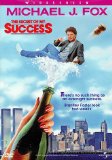 |
The Secret of My Succe$sThe Secret of My Succe$s (1987)
The Story of an ambitious young man who wants to conquer corporate America. Although he doesn’t climb through the proper channels and there’s plenty of 80’s style “you can do anything”, there’s lots of good lessons. For example, in the movie he was able to climb just by filing the proper paperwork! Some great lessons include the power of charisma, the power of information, the value of social networks, and so on. Although this may be a more arguable point, that sometimes it takes a bit more than hard work to get ahead, you also need to create your own luck. I would of course not recommend creating luck the way Brantley (played by Michael J. Fox) did in the movie, but the idea is that he took his destiny into his own hands. |
 |
Jerry Maguire (1996)
Ignoring the two big quotes from this movie: “You had me at hello” and “Show me the money”, this movie is what entrepreneurship is all about. Jerry is a successful agent for his clients at a large firm when he comes to the realization that things aren’t working for him. He writes a mission statement of what the company should be, where agents should have less clients so that they can foster better relationships. Needless to say, this doesn’t go well. So he sets off on his own to start his own company with his own clients which will be run according to his mission statement. He will focus his business on managing less clients but taking more time and effort with each client. On building relationships with them. And like any business, the start can be rough. It never quite goes as planned (it honestly rarely does – double to triple your estimates, and not your best estimates), and in this movie he almost loses everything. But he is able to pull through, and he does succeed. |
 |
Hitch (2005)
You might be wondering why this movie is in the list, it’s because it’s not just about romance. Business is about understanding your customer’s problems and finding solutions to those problems. In this case Hitch is a successful consultant not only because he’s good at what he does, but also because he’s figured out what his customers want, even when they don’t really know it. What’s also interesting is this is one of the few movies you see someone be selective with their customers, and even fire their customers. Hitch interviews all his clients to make sure their intentions are good, and only then will he work with them. If he finds out later that they aren’t, he immediately fires them. All around a good movie showcasing the importance of understanding what your customers problems are and finding solutions for them. As an added bonus, he always demonstrates the power of word of mouth marketing! His business is not exactly something you want to advertise on a billboard, so it has to be through word of mouth. And he is successful. |
 |
Forrest Gump (1994)
Shrimp anyone? Even Lieutenant Dan didn’t believe Forrest could start a shrimping business. The main lesson here is that it doesn’t take brilliance to start a business, anyone can. Sure Forrest had a little luck because of a storm that wiped out his competition, but had he not tried he never would have gotten anywhere. And he definitely wouldn’t have been on the cover of Fortune Magazine as depicted in the movie. Starting and running a business takes more than skill. It takes a lot of hardwork. But most important, you have to actually start the company! As I’ve said before, Ideas are a Dime a Dozen. Not to downplay them, but the concept is that coming up with an idea is not hardest part of a business, executing the idea is. And in the movie, we see Forrest does just that! |
 |
Baby Boom (1987)
A high powered executive (known as the Tiger Lady) inherits a baby and suddenly finds her life turned upside down. She eventually makes the decision to move away to the country to raise the baby. Once there, she comes across the idea of creating high quality baby foods for a niche market. Being the 80’s and all, there’s the classic montage of her building her business into a very successful business, so successful that her previous company offers to buy her out. The biggest lessons learned from this movie are about the importance of niche markets. How it’s important to focus on thing and be the best at that thing. Had she created another brand of baby food, it would’ve just been another baby food company, and she would’ve had no chance. Instead she found a segment of the market she wanted, then she spend some time analyzing that market for it’s potential (yes, you actually see her analyze her market segment/niche in the movie). It’s important to have a USP (Unique Selling Proposition), and J.C. (the high powered executive) definitely figures hers out. |
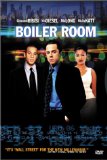 |
Boiler Room (2000)
You would think this is the movie to show you what not to learn about business because it’s all about scamming your customers. True, I agree, but there are still several things to learn. My favorite quote: “And there is no such thing as a no sale call. A sale is made on every call you make. Either you sell the client some stock or he sells you a reason he can’t. Either way a sale is made, the only question is who is gonna close? You or him? Now be relentless, that’s it, I’m done.” That’s right, this movie is mainly about high pressure sales tactics. Although I personally disagree with this kind of sales tactic, but it’s still important to understand because it will eventually be used on you. They also discuss about market segmentation, but not exactly in those terms. They discuss how some customers are more profitable then others, and how to identify them. How to determine which are the fat whales. There are some other great lessons in this book, especially the importance of questioning a too good to be true deal. You’ll definitely get learn something from this movie. |
| Pirates of Silicon Valley (1999)
Who doesn’t know Bill Gates or Steve Jobs? What better movie can there be on business than the story of how those two started their companies. Although it’s not exactly known for it’s accuracy, it’s still an amazing movie with a lot to learn from. These are two different people that both succeeded wildly yet took very different paths to success. What’s also very interesting is the impact of some of the decisions they made early on. There’s a saying that basically goes along the lines of, you can be good in business and succeed, but you need to be both good and be lucky to succeed wildly. They were both good, and fortunately for both for them, they also both made some very good decisions early on. |
|
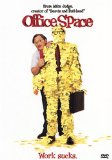 |
Office Space (1999)
How can this movie not be on the list. It’s a classic! Of course it’s not so much about learning how to run a business as it is about how NOT to run a business! But still this movie is just too hilarious to leave out. Examples of how not to run your business include TPS reports. Or having a dozen managers ask you about your TPS report. Can you imagine having to deal with that many managers? One of my favorite quotes is: “Yeah, I just stare at my desk; but it looks like I’m working. I do that for probably another hour after lunch, too. I’d say in a given week I probably only do about fifteen minutes of real, actual, work.”. How can you expect any company to excel and lead if you’re people are that de-motivated. |
 |
Cocktail (1988)
In this movie Brian (played by Tom Cruise) is a very ambitious young man excited to get his start in the business world. He quickly learns that none of the big companies are interested in hiring him without a degree, so he unrolls at the local city college and starts a part time job where he meets his counterpart for the movie. Together they go through quite an adventure. They decide they’re going to open their own bar called Cocktails and Dreams. But to do this, they need money, and this is where they start to diverge on their paths. This also where the biggest lessons can be learned. Having a business partner is not something to do on a whim. It’s very difficult, you need to have the same goals, you need to be able to work together through the tougher times, you basically need to work better together than an old married couple. Above that, and the usual business lessons, another interesting aspect of this movie is that not all money to start your company is equal. That is to say, just because you can get money, it doesn’t mean you should. It may or may not be worth the costs. So be careful when you take money for your business, make sure it’s worth the cost for you, not just personally, but also that you’re not giving away too much for it. |
 |
Rudy (1993)
Rudy is here because it’s so inspirational. Rudy is a movie based on the true story of a “5 foot nothin’, 100 and nothin’ with barely a speck of athletic ability’ man who achieved his dream of playing in a football game for Notre Dame. No one believed he could, not even his family or friends, no one. However through sheer will and determination Rudy was admitted to Notre Dame, got on the football team, and got to play one game. That’s amazing considering he had everything going against him! He worked hard, he persevered where most people would’ve quit. He worked so hard that when the coach said he wasn’t going to be able to play him on his last possible game, the football team revolted and refused to play unless he got dressed. Not only that, they got him on the field. And best of all, as far as I understand Rudy was the only person ever to be carried off the field on the shoulder’s of the other players. That’s how much they respected his dogged perseverance! |
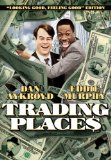 |
Trading Places (1983)
In this movie two investors/businessmen decide to make a $1 bet to see if they can turn a successful person into a homeless criminal and homeless criminal into a succesful business person. It has all the charm of an 80’s comedy. But above that, the two main characters invest and work the commodities market, along the way exposing mis-perceptions about the American Dream. And as a benefit, you’ll actually get to learn about how the commodities market work. And if you’re a bit confused by how the end goes, the following is a good explanation. |
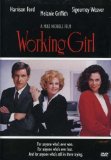 |
Working Girl (1988)
Ignoring the massive 80’s Big Hair, this movie is the story of Tess’s climb up the corporate ladder during the big Merger & Acquisition fad of the 80’s. Above the normal business lessons, this movie really shows the importance of social skills in business. Not only do you need to be smart, but you need to be able to work with people. You need to understand other people’s needs. You need to be able to communicate with other people. And most importantly, it really helps if other people believe in you. |
 |
Aviator (2004)
This is the story of Howard Hughes, from his beginnings all the way to the end. Even though Howard had some personal issues, but he was still an amazing businessman. How many people are willing to make the types of bets he did on succeeding? Betting the whole company many times over? There’s no doubt he was a very smart person, but he also had a lot of ambition and was willing to put his money where his mouth was. And not just on a small scale, but on a massive scale. What I found most interesting is that all the while he was creating and growing his company he was also battling some very big inner demons. He was able to succeed where most people would’ve crumbled, and he built a largely successful company above that. |
 |
Newsies (1992)
Business is not all about making smart decisions and executing on them, it’s also very much about the people behind the business. Without people there is no business. And this movie is in this list because it shows the importance of people. Not so much about getting the right people, that’s another lesson, but in treating your people right. In the movie, the owner of the newspaper company basically decides to decrease the pay of the newsies, which they don’t appreciate. This leads to a strike. Do remember of course that this movie takes place many years ago, when child labour was common and striking wasn’t unionized as it today. In any case, the lesson here is to remember to treat your employees well. This not only includes paying them what they deserve, but also treating them the way you’d like to be treated. It will make a difference in the long term, as Hearst (the owner of the newspaper company) learned the hard way. |
 |
Click (2006)
As important as your business is to you as an entrepreneur, you also have to realize that there are other things that may be even more important. In this movie, Michael (played by Adam Sandler) learns the hard way that climbing the corporate ladder isn’t the most important thing in his life. His family is the most important thing. When starting, and even when running a largely successful company, too many entrepreneurs focus solely on their companies forgetting almost everything else, even their own basic health! And in some cases, they sometimes wear this as a badge of honor. Yes your business is important, but is it the most important thing in the world? You should always ask yourself what the most important thing in the world would be if you had a heart attack today? |
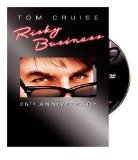 |
Risky Business (1983)
First there’s the obvious standard business lessons. You need a product that people want. You need to market it. You need to … But what’s more interesting is the underlying theme of this movie, which is how greed can corrupt people. Joel starts off innocently enough, but by the end of the movie his business venture isn’t exactly what you’d call mainstream. Mainstream or not though, all businesses obey the same core principles. As he describes at the end, his business is “Dream Fulfillment”. Find what a customer needs and fill that need. |
 |
Tucker: The Mad and his Dream (1988)
To quote the tagline: “When they tried to buy him, he refused. When they tried to bully him, he resisted. When they tried to break him, he became an American legend. The true story of Preston Tucker.” If his story doesn’t inspire you to build your company, I don’t know what will. What’s great about this movie is that it shows that sometimes you need more than sheer will, you also need a bit of salesmanship to go along with it. You need to to sell people on your idea, and more importantly on you! |
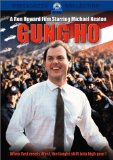 |
Gung Ho (1986)
Although dated, this film shows that business isn’t just about ideas and execution, it’s also a lot about culture. And although this movie is about the 80’s business Japanese business culture clashing with the 80’s American business culture, it’s about a lot more than that. Mergers and acquisitions aren’t always as rosy as they appear on paper. Just because two businesses can appear to have “synergy”, it doesn’t mean they will work well together. But the biggest lesson to take away is that all business have cultures that get established within them. These cultures can be good or they can be bad for the business. It’s therefore very important to cultivate cultures that will benefit the company, especially because it’s extremely hard to change them later. |
 |
Tommy Boy (1995)
“Holy Schnike”, Tommy Boy is on this list? Yes it is. Why? To quote Ray Zalinsky (played by Dan Aykroyd): “Truth is, I make car parts for the American working man because I’m a hell of a salesman and he doesn’t know any better.” In other words, a great product doesn’t make a great business. It sure helps, but it doesn’t guarantee you’ll succeed. Betamax was better than VHS. The Mac was better than Windows in the 90’s. There’s countless examples of products that were superior but lost out. To succeed at business you need to be able to sell and market yourself. |
 |
You’ve Got Mail (1998)
Although the central theme of this movie is the love story between Joe Fox and Kathleen Kelly (played by Tom Hanks and Meg Ryan), it’s also about a small company having a big competitor move into it’s market. It’s generally better if you can be the aggressor, but if not, you need to be prepared and learn how to differentiate yourself. In this movie Kathleen’s store is very different from Fox Books, it’s personable, it’s memberable, and so on. But it’s still not enough to compete with discount prices on commodity items (the same book can be purchased cheaper down the street). She wasn’t able to learn how to differentiate herself enough before it was too late. Therefore the lesson here is don’t try to compete head on with a big company on their terms, find another way to compete with them on your terms, one which you can hands down beat them. And go from there. |
 |
Family Man (2000)
With anything else, you need to have balance. And to reach the very top of success requires a lot of sacrificing, which Jack (played by Nicholas Cage) has done in this movie. But is it worth it? Is all the money worth it? Maybe, maybe not. Assuming you don’t want to be the very best of the best, it’s important to realize that starting a business does require some sacrifices. If you want to start a business at night and on the weekends, then that’s coming out of your free time. Also expect it to take a long time, there’s no way you can do it in just a few short months. If you want to go even bigger than that and quit your job, then expect to be working more and harder than your full time job to get your company started. Success does require a great deal of effort, it isn’t easy. Otherwise everyone would be doing it. |
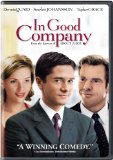 |
In Good Company (2004)
The most obvious business lessons to take from this movie is that there are multiple ways to successfully run a company. And there are the multiple approaches to building up your client base. In the movie Dan does it through social networking while Carter does it through cross-promoting, etc. Both are very successful in their own ways. Another lesson I personally cherished is that just because there’s a new way to do things, it doesn’t mean it’s always the best or right way. In many cases it is, but not always. How many of you remember the main business strategy of the dot com era? The idea of getting as many eye balls on your company’s website as possible, no matter what the cost. Dominate the market segment and then figure out how to be profitable. Always, always, listen and understand why it was done the way it was done before you jump into a new way of doing things. |
Honorable Mentions
The following are more great business related movies that you can benefit from watching, movies that I could have made fit in this list but would have made the list too long to read. They include:
- Click (2006)
- Clerks (1994)
- Mr Mom (1983)
- For Love or Money (1993)
- Greedy (1994)
- Fun With Dick and Jane (2005)
More Mentions
The following are related movies that are suppose to be really good but that I just haven’t yet seen:
- The Triumphs of the Nerds (1996)
- Glengarry Glen Ross (1992)
- E-Dreams (2001)
- Barbarians at the Gate (1993)
- Rogue Trader (1999)
- Code Rush (2000)
- Big Night (1996)
- The Corporation (2003)
- Capitalism: A Love Story (2009)
If I missed any please add them below in the comments.
Permalink to this article Discussions (2)
How to Get a Pay Cut AND Be Happy About It

Let me start by asking which you’d prefer:
- A 10% raise?
- A 3% raise?
If you’re like almost everyone, the answer is hands down #1. But let me re-phrase the question a bit. Which would you prefer?
- A 10% raise in 1980?
- A 3% raise in 2009?
Is your answer still the same? I bet you think it’s a trick question because I added a year to the options. You’re right, it IS a trick question! The years 1980 and 2009 are special. Can you guess why? 1980 is very well known for having a very high inflation rate whereas 2009 is known for being a deflationary year (a year where the inflation rate is negative). In 1980 the inflation rate was 13.5% whereas in 2009 it was -0.4%. Having brought this new information to light, is your answer still the same?
In other words, which do you prefer:
- 10% raise at 13.5% inflation in 1980 = a real -3.5% raise in terms of purchasing power
- 3% raise at -0.4% inflation in 2009 = a real 3.4% raise!
Looking at the numbers adjusted for inflation, option #2 is now by far the best economical choice, beating option #1 by almost 7%!! Option #1 is actually a pay cut!
Now here’s the kicker, although most people realize option #2 is the best economically, the majority of us FEEL that the person in option #1 is HAPPIER with their raise than the person in option #2. Notice here I said feel happier, NOT that they were financially ahead! Although we’re able to differentiate between the two, most people still believe they would feel happier with option #1!!
What’s more, this same research paper (Money Illusion) also discovered that people believe the person in option #2 was more likely to leave their job. Basically, as William Poundstone summarized in his book Priceless, the overall theme of the paper is:
“$$$ = happiness = actual dollars NOT ADJUSTED FOR INFLATION”.
So how do you get a pay cut and be happy about it? Get a raise, but have that raise be less than the rate of inflation.
Permalink to this article Discussions (0)
As If We Weren't In Enough Trouble Already?

We all know the real estate market is in a mess right now, and most of it is really our fault. Too many people took on mortgages they never should have. But it’s not just the borrowers that are guilty, the lenders need to take their share of the blame. Obviously everyone should know when they’re over-extending ourselves, but in obvious situations many lenders still encouraged people to get mortgages. They often helped them get financing through more creative ways, such as loan/mortgage applications that didn’t require any proof of employment, interest only payments, 105% financing, and so on. I won’t even mention mortgages that required high and consistent capital appreciation just to be sustainable.
As part of this mess, many different sales techniques were used. A very common technique was focusing on how much mortgage you CAN afford per month (not how much you SHOULD afford per month). What this means is that instead of looking at the total purchase price, you focus on the monthly payments. By doing this, especially when interest rates are incredibly low, you end up buying properties that in any normal time is well above what you can afford. Which also means that when interest rates go back up, which they will, you’re in a lot of trouble!
Again, the benefit of this selling technique is that you can take the focus away from the real price and look at what you can spend each month. This gives the seller a lot of leeway in the price (not to mention it helps increase commissions). As an example, adding $2000-$5000 on a $500,000 mortgage amortized over 30 years (at our current historically low interest rates) barely changes the monthly total ($9/month and $22/month respectively)! Even adding $20,000 isn’t that big a deal. At 3.5%, $20,000 barely adds $90/month more. $90/month more on a $2500/month mortgage is not a big difference.
But, getting back to the reason for this post, is that lenders have now come up with a new method of rationalizing why you should purchase overpriced properties, or at least a method that I haven’t personally seen yet. Here’s the exert from Tales From the Real Estate Wars:
“Now’s the time to move up to a larger house and eradicate any loss on your present house! How, you say? Come a little closer and I’ll explain: If you bought a house for $350,000 and it is now worth only $280,000 (20% less), you have only “lost” $70,000 if you sit still and do nothing. But if you buy that really big house in the nicer community that used to be worth $550,000 and is now also 20% lower, the moment you close on that house at $440,000, you’ve gained $40,000 ($110,000-70,000). And hey, that’s before you get the $6,500 tax credit! Plus, have you seen how low the interest rates are?”
It’s really perverse logic, but at the same time I can see how people can fall prey to it. They’re focusing on people’s loss aversion fears which is a very strong emotion!
Do you see the flaw in the logic?
Permalink to this article Discussions (0)
The Power of Scarcity!

The other day on my way home I came across this sign for a new gym. Only 500 memberships are available! It must be an exclusive gym right? Only 500 memberships? How many gyms do you know that limit their memberships? I better go get mine now while I still can!
Or should I? How many memberships is 500 for a gym? Is it a lot? Is it very few? Who knows, and to be honest, it doesn’t really matter. The key metric to how busy a gym is going to be is how many active members they have. If it’s not already common knowledge, the reason most gyms sell yearly memberships is that a large number of people won’t keep going past a few weeks to a few months. Even with the best of intentions. This is why they oversell memberships, and why gyms are generally more packed around News Years. How many memberships do you think are unfilled New Year’s Resolutions?
This however is the first time I’ve seen a gym display an actual real limit to the number of memberships they will offer. At all other gyms I’ve seen they’ll just take your money and enroll you no matter how many members they already have. I don’t ever remember seeing a gym limit their membership. But is 500 a high or low number? If they’ve never had more than 300 memberships, then 500 is more than they’ve ever had so it could almost be considered an unlimited number of memberships. But our perceptions that there is a limit makes us value each membership much more than they’re really worth!
I will therefore bet that because they’ve put a limit, whether or not it’s real or artificially so high that it’s in essence unlimited, that they will get a LOT more sales than if they had the very same sign with just the two words “only 500” removed!
Scarcity can be an effective marketing tactic, and this is a perfect example.
Permalink to this article Discussions (0)
iPad Versus Kindle
It’s official, Apple has just released the new hardware offering, the iPad a few minutes ago. It’s basically a big brother to the iTouch with some additional features and performance (at least as much as I can tell this far into Steve’s introductory presentation).
Although the price hasn’t yet been announced, I suspect this will be in direct competition with the Kindle, so it’s no wonder Amazon released their Kindle development kit early. But is it enough for Amazon?
I will bet that even if the Kindle is cheaper, and has a longer battery life, the iPad will trump the Kindle soon enough. Not only does it do a lot more (watch movies, etc.), IT’S IN FULL COLOR!! Being able to read a book in color is much more exciting than if it’s just in black and white. And Apple already has the iTunes store ready for distributing and selling digital media, including books. Never mind the hundred thousand plus applications in the App Store!
I hate to say it since I buy tons of books from Amazon, but watch out for digital media (digital books). It’s going to be hard for Amazon to compete with the iPad. Even if the iPad ends up costing significantly more than the Kindle, which I suspect it will.
Update: Apparently the battery life on the iPad is 10 hours of video or 1 month of standby time!
Update 2: I predict the demise of the Kindle if Amazon doesn’t do something very very soon. At a $499 entry price for the basic iPad, it’s a no brainer. The iPad $499 version has multiples more storage space, better processor, gaming, videos, tons of apps, books of course, and did I mention it’s FULL COLOR! The only benefit the Kindle has right now is the quantity of books and Amazon’s distribution channels. For now…
Permalink to this article Discussions (2)
2009 – A Year in Retrospect

2009 has been my busiest year to date since I’ve started blogging almost 4 and a half years ago and founded LandlordMax 6 years ago! Looking back, it’s hard to believe everything that’s happened. Which is why I’m going to take a breather today and look back at 2009, to share with you all that’s happened. Every once in a while I like to do that, and it’s been way too long since the last time.
When 2009 started, LandlordMax (the property management software company I founded) was growing at a very nice pace and the real estate market hadn’t collapsed as far as it has today. We were in the process of trying to release our biggest ugprade, version 6.05. We were also trying to get a Mac version out in the first half of the year, and hopefully get much further on the networked multi-user version. I had also just published my book Blog Blazers (November 2008) in which I had interviewed 40 top bloggers about their take on blogging. Above that I was in the process of a major redesign of this blog. Those were the major items on my plate as 2009 started.
Overall it mostly went as planned, with some surprises and exceptions. The biggest unexpected was just how much work it was going to take to make it all happen. If I had known ahead of time just how busy 2009 was going to be, I probably would’ve been a lot more stressed. Sometimes ignorance is best. In any case, here is my journey broken down into sections:
LandlordMax
Just to quickly re-iterate, LandlordMax is the company I founded about 6 years ago. The company primarily builds and sells property management software to real estate investors, property management companies, property managers, banks, colleges, and anyone else who needs to manage rental properties. The software manages the accounting, workorders, invoices, leases, tenants, buildings, and about a million other things. It’s a very useful and powerful piece of software.
When 2009 started, we were very actively working on a major upgrade of LandlordMax, which eventually was released as version 6.05 in May 2009. In it we included many new features, including a large amount of charting, email integration, Outlook support, whole new sections (accounts, contacts beyond tenants, vendors, etc.), over 20 new reports to the already more than 100 reports, and lots of other exciting new features. It was a massive undertaking that although started long before the year began, was finished before the year ended.
The only downside is that we couldn’t offer all the features we had wanted to and release it within a reasonable time. For example, we wanted to offer a feature we called “Archiving”, but as we tried to implement it, I realized it was going to be a major undertaking, taking more time than I wanted to get this version completed.
We also tried to get check printing into the software but had I to make the very hard decision to push it to a future release. After having committed a lot of time and money to check printing, it became clear that it wasn’t going to be doable within the time frame we had. So for now, this is a feature that has been put on hold. I hate to see all that effort put on hold, especially after having already invested so much effort and time, but it was the right decision. It was the hardest decision I that I had to make in 2009.
That being said, LandlordMax version 6.05 was very successfully released in May 2009. The feedback and comments we received have been amazing. Here’s just a few samples of the latest testimonials: 1, 2, 3. And those are just the ones I’ve published here on my blog, there’s many more on the LandlordMax Success Stories page.
Within days of version 6.05 being released, a big push went forward to make it available on the Mac. We’ve been working on this on and off for some time, going as far back as 2007. The problem with the Mac version is that there’s always tons of small and extremely annoying differences that need to be correctly handled. Things from how the installer works to how the program is rendered on the Mac. But this year I decided we had to make it happen no matter what. What I initially thought was going to be a certain amount of worked turned out to be a lot more than I had planned. And I mean a lot more! On the scale of 3-5 times more work!
Back in August 2009, I was already mentioning here how the Mac version was going to be coming very soon. That we only had one issue remaining. How wrong I was! A month later, in September I wrote about it again saying how wrong I was in my last post. We had resolved it, but now there were other issues.
One issue that was particularly troubling was due to the fact that LandlordMax is built on the Java platform. On the Mac, Leopard uses Java 5, and Snow Leopard uses Java 6. There is no overlap, and you can’t choose one version or the other, they each use a different version. Which means to support Leopard and Snow Leopard we needed to make LandlordMax fully Java 6 AND Java 5 compliant!! We’d been planning to upgrade to Java 6, but we were hoping to push that off until after the Mac version was released. Turns out we had to deal with it now.
At the end of October, we finally released the Mac version of LandlordMax! And it was compatible for all versions of the Mac OS, Leopard and Snow Leopard. Not only that, but you could take a backed up database file from the Windows version and move it to the Mac, and vice versa. In other words, you could use LandlordMax interchangeably on the Mac and Windows!
The Mac version of LandlordMax has since been received with lots of enthusiasm as shown in this initial testimonial, with many more to come. But in terms of estimated cost, we spent several times more than I had initially planned. And this is after having already committed lot of resources in the past.
During all this, the property management software market has dramatically changed. A company that’s been buying up many of our competitors over the last couple of years in the hopes of becoming a major player, Domin-8, has filed for chapter 11 bankruptcy. They acquired companies such as Rent Right, Spectra, Tenant Pro, iCam, Management Plus, and so on. This is big news because most companies have very limited success after filing for Chapter 11. Not only this, but we’re already starting to see people jumping ship as they’re learning the news. No one wants to be stuck with a software from a company that’s no longer around, especially with the speed of technology today. Which means 2010 may be a very interesting year for the property management software market. A shakeout year…
And as you all know by now, the real estate market has also been going through a major recession! You would expect our sales to be impacted negatively, but quite the contrary has been going on! Our revenue growth hasn’t stopped in the slightest, we’re still growing at the same fast rate as before as shown below (the graphs below only include sales of LandlordMax):
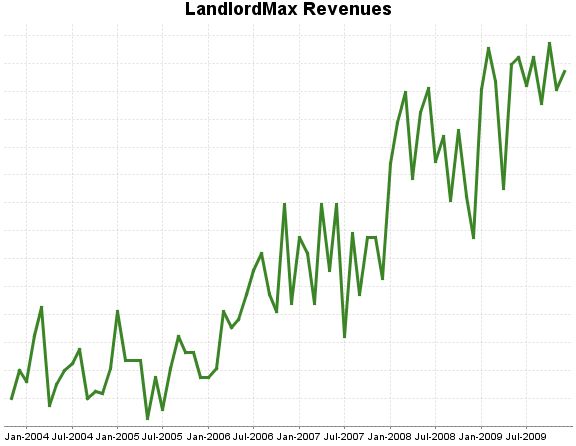
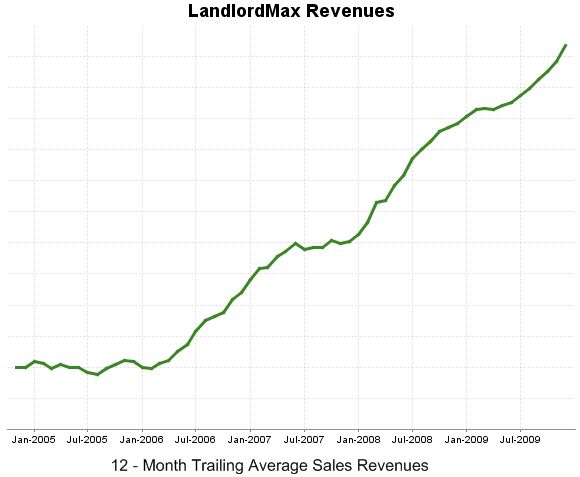
All in all, it’s been a great year for LandlordMax. Things have definitely been going in our favor. The only thing we haven’t yet succeeded in doing is releasing the networked version. A lot of work has already been done here, but the progress has been slower than I’d have liked. Not because it’s hard or a lot of work, which it is, but because I’m always having to allocate effort away from it to other more immediate items. For example, to get LandlordMax version 6.05 out on time, we had to pause the effort on the network version for several months. And for the Mac version, well let’s just say that all the effort was focused on the Mac version during those months. Like I said before, the Mac version required much more work than anticipated and I made the commitment to follow it through, even at the cost of delaying other items.
Which means that this year, we’re now working very hard on the network version. I expect there will be a new version of LandlordMax before the networked version is available, but I can’t confirm this. I also believe it won’t be until at least late in the year that the networked version will be available, if not in 2011. Above this, the website is in the process of going through a major uplift! That’s what’s going on right now. We’ll see what happens. I can’t wait to write a similar post when 2011 comes on what happened this year!
Blog Blazers
In November of 2008, I published the book Blog Blazers. In Blog Blazers, (also available on Amazon), I interviewed 40 top bloggers, (bios can be found here). The book took me a good year to publish and I’m very proud of the results. In it I asked everyone the same questions so that you the reader can compare apples to apples and oranges to oranges. Not only that, but one of my goals was to make sure the questions had a lot of follow-up material so that you could continue learning after you were done reading the book. Questions such as What was your most successful blog post ever? Which books and websites do you recommend to new bloggers? What’s your best tip for writing a successful blog post? To name just a few. I even wrote some follow up posts to help people find further resources such as 10 Most Popular Books in Blog Blazers.
Because the book was released in mid-November, it was just in time for the Xmas rush. And of course, because it’s a new book from a new company (Levac Publishing House – owned and operated by yours truly), there were some initial distribution issues. For example, Amazon will only initially order a limited number of books for new books and from new publishers. And because of this, Blog Blazers was almost immediately out of stock on Amazon. The good thing is that although it took alittle bit of time, we were able to resolve the issue quickly enough. And of course, it’s a good problem to have!
Other than that small initial glitch, Blog Blazers as a whole has been a pretty smooth ride. Most of the issues with the book were in it’s production, the marketing and sales was fairly similar to LandlordMax. Actually, I learned so much from the production side that I ended up writing a 3 part series on how to publish a book. Here is the link to the series: Part 1, Part 2, Part 3.
The biggest thing I learned about publishing books is that profits can only really be made by selling books in large volumes. You have to move at least 10,000-100,000 books to make any kind of money. Less than that and I’m at a loss how you can make any profit (assuming you have a marketing budget). The profit margins are definitely lower than I expected. To be honest, I really did learn a lot more than I ever expected about the book publishing industry. I now have a very big appreciation for the effort that goes into making a good book, and just how hard it is to produce and succeed. I now thing that books in general are under-priced. That being said, lots of copies of Blog Blazers were moved. Right now there’s just a fraction of what I initially printed left before I need to make a decision on the next print run. So that’s pretty exciting.
In regards to how the book has been received, it’s gotten a ton of glowing reviews. It’s been reviewed on major websites, blogs, magazines. It’s landed me several interviews, podcasts, radio spots, video reviews, guest appearances, etc. It’s been used used for a workshop at Drake University. What’s also very excited is that on Amazon, a site known for it’s reviews, Blog Blazers has gotten an average 4.5 star out of 5 stars! Almost no books get 5 star reviews, it’s extremely rare. Most books get anywhere from 3 to 4 stars. 4.5 stars is exceptional!
As the year has been wrapping up, I’ve had to decrease my marketing efforts. Right now the book is mainly selling itself through word of mouth. I might put another big marketing push or two, but I don’t expect to put as big a marketing push as I did in 2009. It’s a lot of work and because of that I believe it took a lot of my time away from LandlordMax. It was ok for 2009, but I can’t commit as much time to promoting Blog Blazers in 2010 as I did in 2009, not with everything coming down the pipe for LandlordMax.
Overall though, Blog Blazers was a success which I’m very proud of it. The only thing is that in retrospect had I known beforehand what it takes to publish a book I doubt I would have done it. The last time I had calculated, I put 1000-2000 hours into publishing the book. That’s just my time! This doesn’t include the money I invested. It’s definitely a costly endeavour. So if you’re planning to write a book, you should really check out my book publishing series I wrote on my blog (mentioned earlier). It’s a BIG project! Not that there’s anything wrong with it, it’s just nice to know what you’re signing up for before you actually do sign up.
FollowSteph
As always, in 2009 I continued to write articles/posts here. The biggest workload came from a complete custom re-design of the site. And I have to give credit to Reuben Whitehouse for it’s success. He designed the new logo, as well as the whole look and feel. If you’re interested, Reuben wrote a blog post about how he designed and came up with the FollowSteph.com logo. It’s a pretty cool post with lots of pictures and explanations on how he did it.
The other big news for FollowSteph is that the Feedburner subscriber count, which I don’t publicly post yet, has been climbing fast. In 2009, the blog grew in subscriptions by 500%!! I can’t even begin to describe how exciting that is!! Normally I’d see a 50% to 100% yearly growth, never 500% times. 2009 was a big year. Very exciting stuff!
For 2010, my main goal is to increase my blog postings, bring it back to my pre-2009 levels. 2009 was just so insane that I have to admit I didn’t post as much as I use to. Especially the last few months of 2009. In November and December I only had 2 posts each. My goal is to get back to my usual posting schedule of at least once a week, preferably more if time permits. It’s definitely not a lack of ideas and things to say, it’s a lack of time.
RealEstatePigeon.com
RealEstatePigeon.com is a completely new website/project sponsored by LandlordMax! I’ve never once talked about it. This is the very first time right now!
RealEstatePigeon.com is expected to be publicly released later this week or early next week. You’re more than welcome to check it out now, just be aware that we’re putting on the final touches as we speak. There are a few outstanding graphical issues. That and I’m in the process of seeding it a bit more before fully going public with it.
What is RealEstatePigeon.com? It’s a Q&A (Questions and Answers) website about real estate. The website is based on the success of StackOverFlow.com, a Q&A website for programmers. The idea is that you’ll be able to ask real estate related questions and get answers. Not only that, but because it’s a community website, you can also show off your real estate knowledge and answer questions posed by others.
The differentiator here is that unlike discussion forums where the answers are all listed in chronological order which makes you have to read everything just to get any idea of what’s going on, you’ll be able to quickly see the best answers. This will work because all the answers get voted on, and the best answers will get pushed up to the top based on the number of votes. So the better an answer is, the higher it goes and the quicker you can get to it.
Not only that, but the website is going to have a reputation based system. What this means is that you receive reputation points for each of your questions and answers that are up voted. The more reputation points you get, the more real reputation and credibility you get. And the more real reputation you have, the more real opportunities you’ll get offline, in the real world.
For example, on StackOverFlow people have gotten such high reputation scores that it’s attracted the attention of people looking to hire experts. Yes, opportunities are being presented to people directly because of their reputation scores! People are getting contracts because of their reputation scores. People are getting hired for work because of their reputation scores. Basically, people with high reputation scores are attracting the attention of others who want to work with them.
Therefore the goal of RealEstatePigeon.com is that not only will you get answers to your real estate questions, but you’ll will be able help others (and as a side effect show off your knowledge). And in return for helping others, you’ll be able to potentially achieve success yourself! Who wouldn’t want to work with a mortgage broker who had a high reputation score. What about a knowledgeable real estate agent? When you approach an investor for money, wouldn’t it be great to be able to show them how much you know and your reputation score? Even better, I can’t wait to hear from the first person who tells me they got approached by investors instead of them having to approach investors because of their reputation on RealEstatePigeon.com!! That’s the ideal goal! To get people come to you rather than you going to them!

2010
To summarize, in 2010 I plan to:
- Continue to grow LandlordMax
- Release at least one new major version of LandlordMax
- Get very close to releasing a networked and multi-user version of LandlordMax
- Finish the major uplift of the LandlordMax website
- Sell out all the remainder copies of Blog Blazers’ first print run
- More than double the number of subscribers to this blog
- Bring back to the posting frequency to pre late 2009
- Launch RealEstatePigeon.com with success
- And have a lot fun doing all of the above!!
Let’s see what happens.
Permalink to this article Discussions (4)
Why I Have So Many Printers
I hate to admit it, but I have more printers than I have computers. Why is that? Is it because I love printers? Not at all. It’s because it’s economically cheaper to buy a new printer almost every time I run out of ink.
For example, today on Amazon I can buy the Canon iP3600 Inkjet Photo Printer for $43.08. Don’t be fooled by the sale price, just do an Amazon search for printers in the $25-$50 range and you’ll find lots of printers in that price range. Many are cheaper than this Canon printer, I just picked it because the discount wasn’t as heavy as some of the other models.
Now if we look at the price of ink cartridge to replace it, what they call the value pack, to replace all the colors including black, it comes to $41.05. Yes, it’s actually cheaper to buy a new printer than to buy ink. And I get a new printer!!
I understand that ink is where printer manufacturers make their profits, and that more often than not the printers themselves are loss leaders, but this is a bit ridiculous. Is it just this one case?
Epson has a WorkForce 30 Color Printer selling for $59.99. To replace the ink requires a $16.49 purchase for black ink and a $32.99 purchase for color ink. Combined, that’s $49.48, just $10 shy of a brand new printer!
And it’s not just Canon and Epson that do this, pretty much all printer manufacturers are in the same boat. Too often the price of replacing the ink is equal to or greater than the price of a new printer.
I do understand that the ink packs they give you with new printers aren’t the same size as replacements, but most people don’t generally think about this when they’re in the store itself making the purchasing decision. What we’re thinking is in the first case I get a free printer. In the second, for $10 more we get a whole new printer!
With this in mind, it’s easy to understand why people such as myself have too many printers.
And don’t get me started on how shoddy most printers are built these days. How many printers have you had that lasted more than a year or two before they stopped working?
PS: The prices on Amazon have already changed from when I initially wrote this post.
Permalink to this article Discussions (4)
Why Ford and GM are Going Bankrupt

Sure there’s the obvious issues like the fact that they have to spend more per car made. Sure there’s the issues with the unions and high salaries. Sure there’s the issues with the lower quality of their cars. Sure there’s the mismanagement issues. Sure there’s the issue that they’re focusing on government bailouts rather than solving their business issues. There’s a lot wrong, no doubt about it. But I believe it’s even more fundamental than that.
Let me ask you a few questions:
- What’s the family sedan from Honda?
- What’s the family sedan for Toyota?
- What’s the family sedan for Ford?
- What’s the family sedan for GM?
I bet you were immediately able to answer the first two questions (Honda Accord and Toyota Camry). I’ll also wager that you weren’t really able to answer the last two. What is the family sedan for Ford and GM? Why is that such a hard question to answer when that’s the most common car people buy?
It’s because they have no focus. They’re all over the place. To succeed you need to be about something, something that people can care about and follow your lead. It doesn’t matter how good your idea is or how good your execution is, without a goal and focus it’s all for nothing. So let’s hope they can figure it out before it’s too late.
Permalink to this article Discussions (4)
| « PREVIOUS PAGE | NEXT PAGE » |






